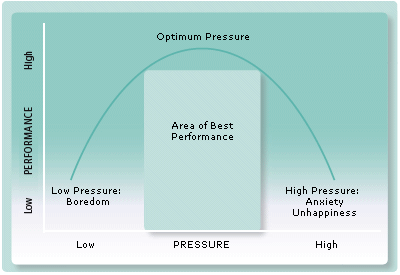Watch Your Health
You should take stress seriously. The negative
effects of stress can have a serious impact on your health, causing
direct – and potentially fatal – damage to your body.
Beware of Damaging Behaviour
When under pressure,
some people are more likely to drink heavily or smoke as a way of
getting immediate chemical relief from stress. Others may have so much
work to do that they fail to exercise or eat properly. They may cut down
on sleep, or worry so much that they sleep badly. In the effort to keep
up with daily work pressures, some people don’t see the doctor when
they need to.
Look after Your Heart
If stress is intense,
and stress hormones are not “used up” by physical activity, a raised
heart rate and high blood pressure can damage the arteries. When the
body heals this damage, the artery walls scar and thicken, restricting
the flow of blood around the body. Stress hormones then accelerate the
heart to increase the blood supply to the muscles, but the blood vessels
supplying the heart muscles with oxygen may have become too narrow to
meet the heart’s demand. If this happens to you, you may, at best,
experience chest pains or, at worst, suffer a heart attack.
Think Smart
Prevention is better than cure. The key to avoiding
serious problems is to seek help before your stress reaches a level
where it has become unmanageable.
If you suspect that you are
prone to stress-related illness, are experiencing persistent
unhappiness, or if you are in any doubt about the state of your health,
you should seek appropriate medical advice immediately.
Understand the Stress–Illness Connection
NOTE
Take stress seriously – it can damage your health
Stress can impair the immune
system, which explains why we are more prone to infections (including
colds and flu) when we are stressed. It may exacerbate symptoms in
diseases that have an autoimmune component, such as rheumatoid
arthritis. It also seems to promote headaches and irritable bowel
syndrome, and it is now suggested that there may be links between stress
and cancer. The link between stress and heart disease is well
established, and if the fight-or-flight response is triggered in someone
with a damaged heart the effects could be lethal. Stress is also
associated with some mental health problems, especially anxiety and
acute depression.
Take Regular Exercise
Whatever level of
stress you are experiencing in your daily life, regular exercise should
form an important part of your lifestyle. Physical activity can help by:
Reducing your physiological reaction to stress by eliminating the stress hormones from your system.
Improving your circulation, strengthening your heart, and
increasing the blood supply to it, directly reducing your vulnerability
to heart disease.
Take up an activity that
you enjoy – that way you are more likely to keep it up. Take up running
or, if you were keen on tennis when you were at school, join your local
tennis club. If you’re not keen on sports, start walking part of the
distance to work every day or enrol in a yoga course. Start off slowly,
gradually increasing the amount of time and effort you put in.
Stress and Performance
In many work situations, our stress responses can
cause our performance to suffer. The best tactic is to adopt a calm,
rational, controlled, and sensitive approach when dealing with difficult
problems at work.
Positive Pressure
Stress can cause us to
respond to situations aggressively, which can harm our social
relationships, or to become passive and withdrawn, in which case we may
fail to assert our rights when we should. However, the pressures and
demands that may cause stress can sometimes be positive in their effect.
For example, an athlete may flood his body with fight-or-flight
adrenalin to power an explosive performance. Deadlines, and the pressure
that they create, can push unmotivated people into action.
Case Study: Coaching for Success
Manuel had just given a
presentation to the board, seeking authorization for a new project. He’d
been nervous beforehand – these were important people and he’d been
worrying about how they’d react. He’d lost his way during the
presentation several times, and had struggled to explain some of the key
ideas. Worse still, the questions asked gave him the impression that
people hadn’t really understood what he was saying. After the
presentation, his manager arranged for coaching on presentation skills
and stress management. Manuel’s next presentation went much better.
The importance
of the event and the expertise of people’s questions increased the
pressure on Manuel to a level where it had harmed his performance.
His
anxieties and worries distracted him during the presentation, and each
time he made a mistake he became even more distracted.
The coaching
Manuel’s manager had arranged for him made him feel much more confident
about the situation, and by using relaxation techniques he was able to
calm his nerves and focus during the follow-up presentation.
The “Inverted U”
The relationship between
pressure and performance is very well summarized in one of the oldest
and most important ideas in stress management – the “inverted-U” curve
that results from plotting the pressure put on an individual against his
performance of a specific task or series of tasks.
This graph shows the close relationship between pressure and personal performance.

Find the Optimum Level
The graph shows that
when there is very little pressure on us to carry out a task, however
important it may be, there isn’t a great deal of incentive for us to
focus energy and attention on it, especially when there may be other,
more urgent or more interesting, tasks competing for attention. As
pressure on us increases, we enter the “area of best performance”. Here,
we are able to focus on the task and perform well – there is enough
pressure to focus our attention but not so much that it actually
disrupts our performance. However, as pressure increases further, there
will be a dramatic decline in performance. The reasons behind this are
complex – gaining an understanding of them will enable you to perform
well under pressure.
The Concept of Flow
When you are operating
under the level of pressure that suits you and are in your “area of best
performance”, you are usually able to concentrate and focus all of your
attention on the important task at hand. When you are operating in this
“area of best performance” without distraction, you are able to enter
what Professor Mihaly Csikszentmihalyi describes as “a state of flow”,
where you feel “completely involved in the activity for its own sake. . .
Every action, movement, and thought follows inevitably from the
previous one, like playing jazz.” You perform at your best “in the
zone”.
You are completely absorbed in what you are doing.
You are sufficiently motivated by what you are doing to resist competing temptations and diversions.
You are not so stressed that anxieties and distractions interfere with your clear thinking about the task.
You are able to focus all your efforts, resources, and abilities on the task at hand.
This is an intensely creative, efficient, and satisfying state of
mind. It is the state of mind in which, for example, the best speeches
are made and the most impressive athletic or artistic performances are
delivered.

Avoid Mental Overload
Although our brains
have great processing power, we cannot be conscious of more than a few
thoughts at any one time. Our “attentional capacity” is limited. When
we’re experiencing too much pressure or there’s just too much to think
about, we become uncomfortably stressed. Distractions, difficulties,
anxieties, and negative thinking begin to crowd our minds, competing for
our attention with the performance of the task. Our concentration
suffers, and our focus narrows as the brain becomes overloaded. This
creates a downward spiral – the more our brains are overloaded, the more
our performance can suffer, increasing distraction and damaging
performance.
Look for Alternatives
When you are stressed you
can start to miss important information, and this can impair your
decision-making and creativity. If you find yourself in this situation,
using this knowledge can help you to avoid some of the pitfalls. If you
feel highly stressed, check that you are not blindly persisting in a
single course of action to the exclusion of other, possibly better, ways
of proceeding.
Techniques to Practise
You may find that being readily available to others
and dealing with constantly changing information, decisions, and
activities stops you achieving “flow”.
Periods of flow are vital to sustaining good performance, so try to find a solution that works for you.
Let people know that you are setting aside parts of the day as quiet periods when you can work undisturbed.
Delegate some of the activities that require the greatest levels of your concentration.
Arrange to work from home one or two days a week.